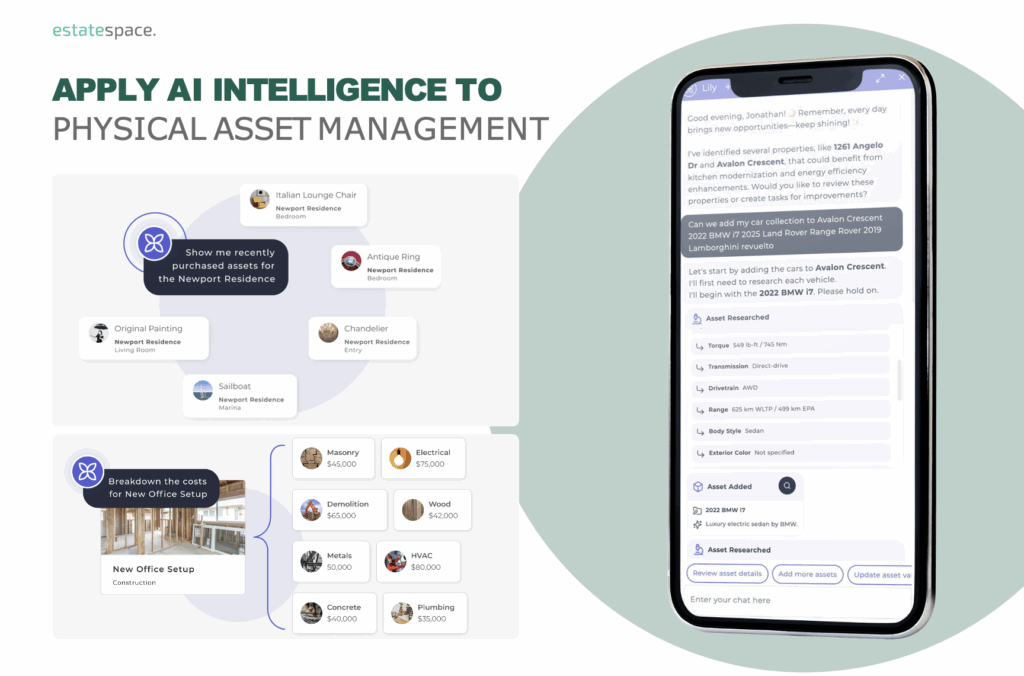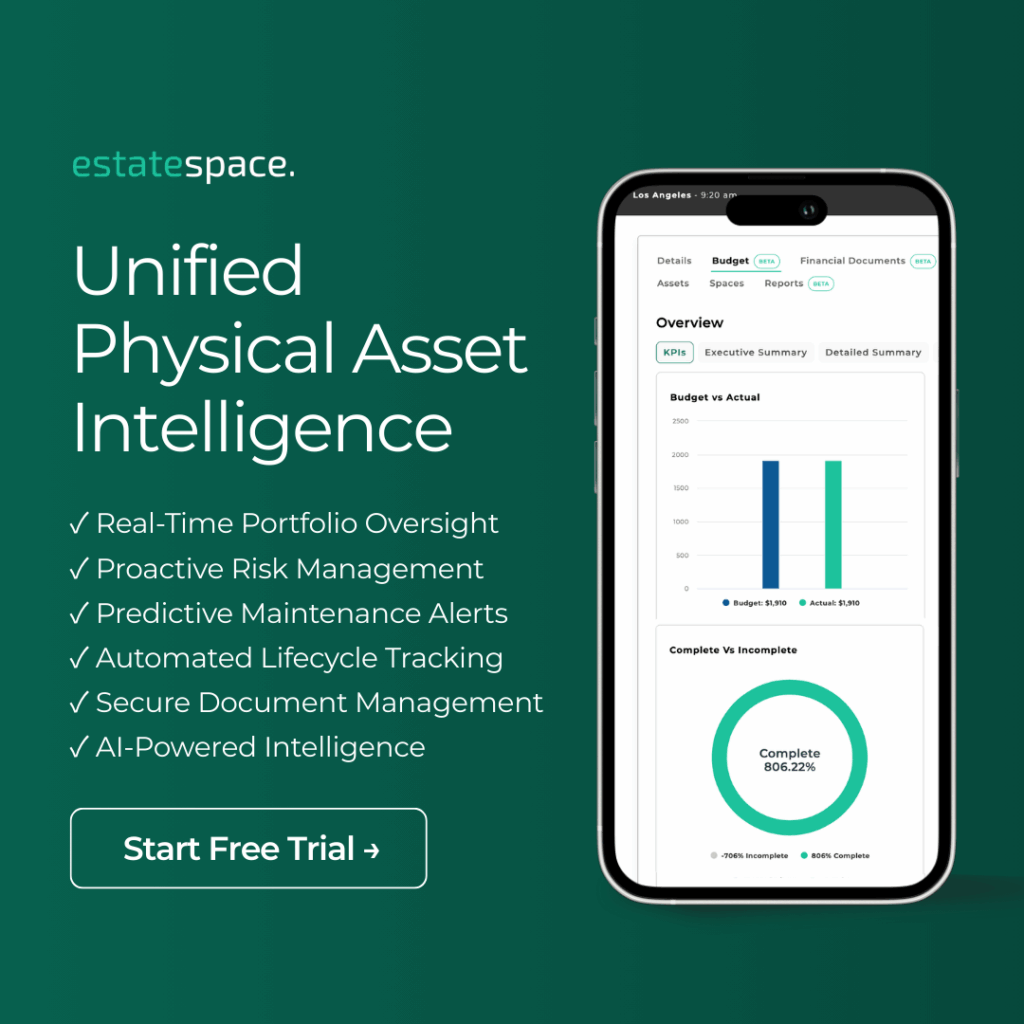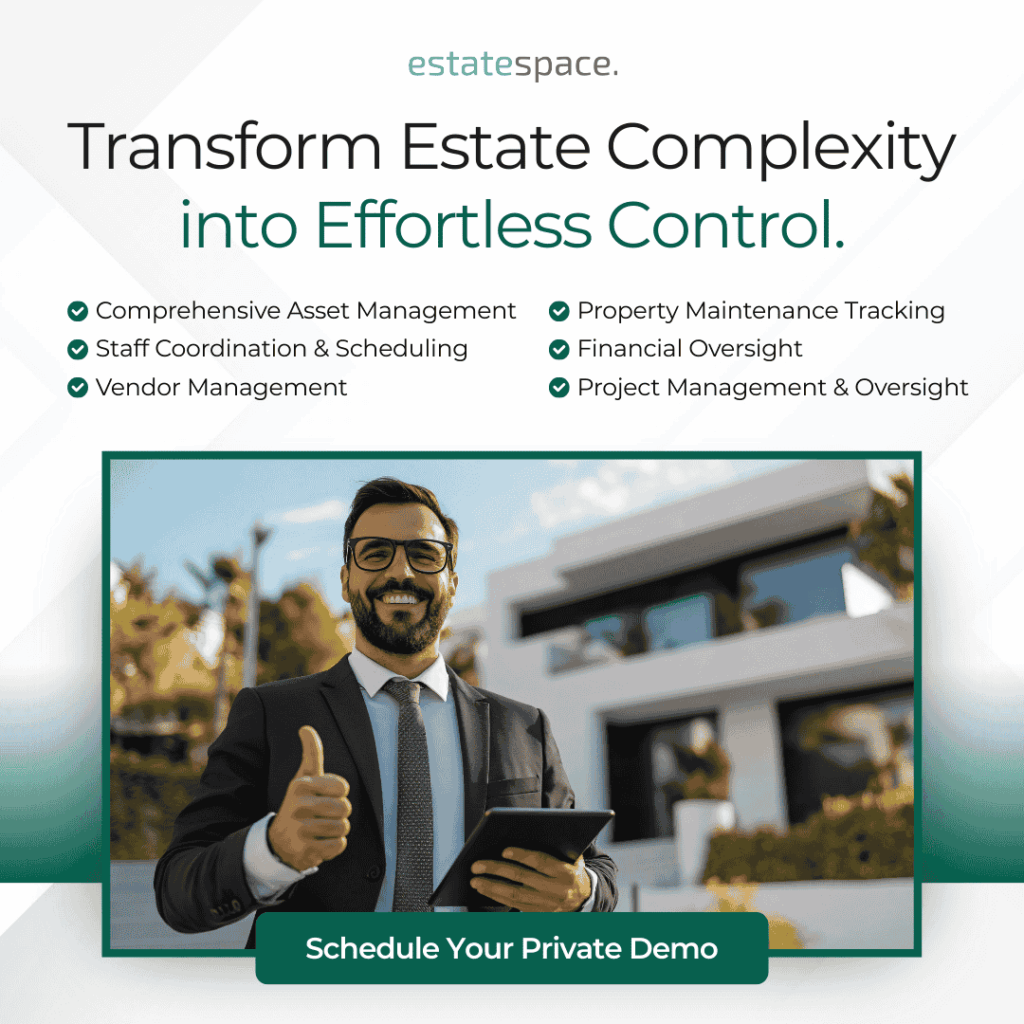Private Estate Management Solutions: Comprehensive Technology Guide
Private estate management solutions have become essential for luxury property operations. They enable sophisticated oversight of high-value estates, valuable assets, and complex operational requirements. Furthermore, modern families and family offices require integrated platforms that streamline multiple properties, art collections, luxury vehicles, and sophisticated home systems. Additionally, effective technology solutions coordinate between principals, staff, vendors, and management teams to ensure seamless operations and exceptional service delivery.
Moreover, today’s luxury estate operations demand more than traditional property management approaches. Instead, they require comprehensive technology platforms that combine asset stewardship, staff coordination, and financial oversight into unified systems. Therefore, successful estate operations rely on technology-enabled platforms that provide real-time visibility and strategic coordination across all operational areas.
Core Components of Private Estate Management Solutions Technology
Modern technology platforms integrate multiple operational areas into comprehensive systems that address the unique challenges of luxury property stewardship. Instead of managing through disconnected systems, successful estate operations rely on unified platforms that coordinate all aspects of property management. Consequently, these integrated technology solutions provide the visibility and control that sophisticated estates require.
Understanding estate management operations helps estate professionals appreciate how comprehensive technology platforms transform traditional property oversight into strategic asset optimization and family service excellence.
Essential Private Estate Management Solutions Features:
- Complete Asset Intelligence: Advanced tracking systems for valuable collections, luxury vehicles, and specialized equipment. These maintain detailed condition records and maintenance histories.
- Integrated Staff Coordination: Centralized platforms that manage household teams, vendor relationships, and service provider networks. They work across multiple properties and locations.
- Financial Management Integration: Real-time budget tracking, expense monitoring, and comprehensive reporting systems. These provide transparent financial oversight and cost optimization.
- Smart Communication Systems: Role-based access controls and secure communication channels that facilitate coordination. They protect sensitive family information.
- Predictive Maintenance Features: Intelligent scheduling and monitoring systems that prevent costly emergencies. They optimize asset performance and longevity.
Operational Challenges That Private Estate Management Solutions Address
Luxury estate operations face unique challenges that traditional property management approaches cannot handle effectively. However, comprehensive technology platforms transform these challenges into manageable, systematic processes. Furthermore, by addressing these core issues systematically, estate operations achieve higher efficiency and better outcomes:
Primary Estate Management Solutions Challenges:
- Complex Asset Portfolio Management: High-value estates include diverse assets like art collections, luxury vehicles, and specialized systems. These require expert care and coordination. Therefore, technology solutions provide integrated tracking and maintenance scheduling across all asset categories. Additionally, asset managers benefit from centralized oversight features that prevent costly oversights.
- Multi-Property Coordination: Managing operations across multiple locations creates coordination complexities that manual systems cannot handle effectively. Consequently, modern technology platforms provide unified systems that coordinate staff, vendors, and activities regardless of property location.
- Financial Oversight Complexity: Luxury estate operations involve substantial budgets across multiple categories and properties. Furthermore, estate maintenance cost control becomes critical for optimizing operational efficiency while maintaining service excellence.
- Vendor Network Management: Coordinating diverse service providers requires sophisticated communication and scheduling systems. These range from specialized art handlers to luxury vehicle technicians. Therefore, technology solutions provide centralized vendor management with performance tracking and automated coordination.
- Technology Integration Requirements: Modern estate operations demand seamless technology adoption that enhances rather than complicates daily operations. However, successful implementation requires user-friendly platforms that provide immediate value while supporting long-term optimization.
Private Estate Management Solutions Implementation Strategies
Successfully deploying technology solutions requires systematic approaches that address both technical integration and stakeholder adoption. Furthermore, effective implementation strategies focus on showing immediate value while building long-term operational abilities. Therefore, successful estate operations follow proven methods that ensure smooth technology adoption and optimal outcomes:
Proven Estate Management Solutions Deployment:
Complete Needs Assessment: Evaluate current operational challenges. Identify specific areas where technology solutions can deliver immediate improvements. Consequently, this strategic assessment ensures technology investments align with operational priorities and family objectives.
Integrated System Design: Configure technology platforms to coordinate asset tracking, staff management, vendor coordination, and financial oversight within unified systems. As a result, integrated systems eliminate operational silos and provide complete visibility across all estate activities.
Stakeholder Engagement Strategy: Secure buy-in from family members, estate staff, and service providers. Show how technology solutions improve their specific responsibilities and outcomes. Therefore, complete training and ongoing support ensure successful adoption and optimal use.
Phased Deployment Process: Implement technology solutions systematically. Begin with core functions and expand features based on proven success and user comfort. Furthermore, this approach minimizes disruption while maximizing learning and optimization opportunities.
Professional project managers specializing in luxury estate operations report that systematic implementation of technology solutions reduces operational complexity while improving service quality and cost control.
Advanced Private Estate Management Solutions Features
Current technology platforms go beyond basic coordination to provide intelligent automation and predictive features. These transform estate operations. Instead of reactive management approaches, advanced platforms enable proactive stewardship that prevents issues while improving performance. Therefore, sophisticated technology solutions become strategic assets that enhance both operational efficiency and family satisfaction.
These technological advances reflect broader technology transformation trends that are reshaping industries through AI-powered automation and intelligent systems. Similarly, understanding traditional asset oversight limitations helps estate professionals appreciate how modern technology platforms provide complete visibility and control that manual systems cannot match.
Intelligent Estate Management Solutions Automation:
Predictive Maintenance Systems: Advanced algorithms analyze asset performance patterns to predict maintenance needs before problems occur. Consequently, this prevents costly emergencies while extending asset lifespan. It maintains optimal performance across all estate systems.
Smart Resource Optimization: Technology platforms automatically coordinate maintenance activities, staff schedules, and vendor appointments. This minimizes conflicts while maximizing efficiency. It works across multiple properties and operational areas.
Financial Intelligence Platform: Real-time budget tracking and expense analysis provide instant visibility into operational costs. They identify optimization opportunities and ensure transparent financial oversight.
Communication Management: Automated workflow management ensures appropriate stakeholders receive relevant information. It maintains security protocols and access controls throughout all operational processes.
Performance Analytics Dashboard: Complete reporting systems track operational metrics, asset performance, and service quality. This supports continuous improvement and strategic decision-making.
Practical Management Steps for Directors of Residence
Recognizing the significant responsibilities and pressures associated with managing luxury estates, directors need supportive strategies that make their role more manageable and rewarding. Therefore, these practical steps focus on building sustainable systems and positive relationships:
Strategic Implementation Steps:
Maintain Detailed Documentation: Keep thorough inventories of all assets, documenting their condition, maintenance history, and value. Consequently, this provides peace of mind and ensures everything is properly accounted for and well-documented.
Build Strong Team Culture: Regularly train and support staff, helping them feel confident in their roles and appreciated for their contributions. As a result, this builds strong team dynamics and ensures alignment with estate standards.
Embrace Continuous Learning: The role of directors of residence is constantly evolving, with new technologies and practices emerging regularly. Furthermore, embracing these changes as growth opportunities encourages teams to adapt and improve.
Personalize Client Services: Understand the unique preferences and lifestyle of the families served. Therefore, personalizing services enhances client satisfaction and builds deeper, more trusting relationships with principals.
Physical asset risk management for family offices requires directors of residence to maintain systematic approaches that protect valuable assets while optimizing operational efficiency.
Technology Implementation and Stakeholder Buy-In
Successfully integrating modern estate management technology requires buy-in from all stakeholders, including family offices, estate owners, team members, and vendors. However, with the right approach, this process becomes an opportunity to improve operations and strengthen relationships:
Strategies for Successful Technology Adoption:
- Communicate Clear Benefits: Explain how technology improves efficiency, enhances asset management, and provides better financial oversight. Additionally, highlight potential cost savings and increased property value that result from systematic management.
- Demonstrate User-Friendly Features: Show stakeholders how intuitive and easy-to-use modern platforms are. Therefore, this eases concerns about complexity and learning curves while building confidence in the technology.
- Provide Complete Training: Offer comprehensive training sessions and ongoing support to help team members and vendors adapt to new systems. Furthermore, this investment in education ensures successful adoption and optimal results.
- Share Success Examples: Present case studies where similar technology has significantly benefited other estates. Consequently, this reinforces the positive impact and builds stakeholder confidence in the investment.
Advanced Private Estate Management Solutions
Modern directors of residence must go beyond basic property management to provide strategic value that justifies their expertise and investment. Instead of simply maintaining status quo, successful directors focus on optimization, innovation, and continuous improvement through advanced private estate management solutions. Therefore, sophisticated technology platforms become essential for long-term success.
Predictive maintenance for high-value asset portfolios enables directors of residence to prevent problems before they occur, protecting valuable assets while reducing operational costs through intelligent private estate management solutions.
Advanced Management Techniques:
Predictive Analytics: Use data analysis to anticipate maintenance needs, optimize resource allocation, and prevent costly emergencies before they occur.
Performance Optimization: Continuously analyze operations to identify efficiency opportunities and implement improvements that deliver measurable value.
Strategic Planning: Develop long-term plans that align estate operations with family goals while optimizing asset performance and preservation.
Vendor Excellence: Build networks of exceptional service providers who understand luxury estate requirements and consistently deliver superior results.
Measuring ROI from Private Estate Management Solutions
Effective technology solutions deliver quantifiable improvements that demonstrate clear value to estate owners and stakeholders. Moreover, tracking key performance indicators helps estate operations optimize their approach and justify technology investments through measurable outcomes:
Demonstrated Private Estate Management Solutions Value:
- Operational Cost Reduction: Specialized private estate management solutions reduce maintenance costs by 20-30% while extending asset lifespan by 40% through systematic care and predictive maintenance capabilities
- Administrative Efficiency Gains: Integrated platforms reduce coordination time and eliminate manual errors that can impact service quality and operational effectiveness across all estate activities
- Asset Value Preservation: Systematic maintenance and monitoring protect valuable collections and equipment from damage, depreciation, and premature replacement needs
- Service Quality Enhancement: Centralized communication and automated workflows improve service delivery consistency while reducing response times and coordination errors
- Financial Transparency: Real-time budget tracking and expense monitoring provide stakeholders with instant visibility into operational costs and optimization opportunities
Understanding AI-powered asset management for family offices helps estate operations leverage intelligent automation capabilities within their private estate management solutions to enhance effectiveness while reducing manual oversight requirements.
EstateSpace: Complete Private Estate Management Solutions Platform
EstateSpace provides comprehensive technology solutions specifically designed for directors of residence managing complex luxury estates. Furthermore, our product overview demonstrates how integrated technology transforms estate management from reactive coordination into proactive strategic stewardship through advanced estate management platforms.
Why Directors Choose EstateSpace Estate Management Solutions:
Integrated Asset Management: Comprehensive tracking and maintenance scheduling for valuable collections, vehicles, and estate systems with predictive capabilities through our technology platform.
Smart Coordination Tools: Automated scheduling and communication systems that eliminate conflicts while optimizing resource utilization across multiple properties using advanced estate management technology.
Financial Intelligence: Real-time budget tracking, expense monitoring, and reporting tools that provide transparent oversight and cost control through integrated technology solutions.
Secure Communication: Role-based access controls and encrypted communications that protect sensitive family information while facilitating effective coordination within our management platform.
Professional Support: Dedicated customer success teams who understand luxury estate requirements and provide ongoing optimization guidance for estate management technology.
Private property management challenges are effectively addressed through EstateSpace’s intelligent workflows that automate routine tasks while providing strategic insights for complex decision-making.
Future-Ready Estate Management
Directors of residence who embrace modern technology and systematic approaches position themselves for long-term success in an increasingly complex field. Furthermore, by combining traditional expertise with innovative tools, these professionals deliver exceptional value while managing their own workload more effectively.
The benefits extend beyond immediate operational improvements. Additionally, professional estate management supported by sophisticated technology demonstrates institutional-quality oversight that supports family goals while protecting valuable assets through consistent, expert care.
Excellence in Estate Management
Success as directors of residence requires combining traditional hospitality and management skills with modern technology and systematic approaches. Therefore, by implementing integrated platforms, building strong teams, and focusing on continuous improvement, these professionals can deliver exceptional results while managing increasingly complex estate portfolios with confidence.
The transformation from reactive management to proactive stewardship creates value for all stakeholders. Furthermore, families receive better service, staff work more efficiently, and valuable assets receive the expert care they deserve through professional, technology-enabled management.
Ready to transform your estate management approach with comprehensive private estate management solutions?
Contact EstateSpace to discover how our integrated platform designed specifically for luxury estate management can streamline your operations, reduce costs, and enhance the exceptional service that discerning families expect from their directors of residence through proven private estate management solutions.







